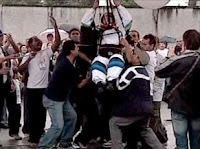 Disgraced former NSW detective Roger Rogerson has been writing reviews about the hit show Underbelly, which remains banned in Victoria pending outcomes of legal hearings involving key characters in the series. The reviews have appeared in The Daily Telegraph and syndicated Australian media coverage.
Disgraced former NSW detective Roger Rogerson has been writing reviews about the hit show Underbelly, which remains banned in Victoria pending outcomes of legal hearings involving key characters in the series. The reviews have appeared in The Daily Telegraph and syndicated Australian media coverage.
“I never liked Melbourne or their crooks. And watching Underbelly last night reminded me why. It wouldn't have happened up here in Sydney like down there. We had more control over the crooks up here, and I reckon most of the crooks would agree. But as entertainment it was pretty good with more sex than violence.”
source: news.com.au
It seems very ironic for Rogerson to be writing about this program. Rogerson undoubtedly has excellent first hand knowledge of underworld dealings, but having been sent to prison for perverting the course of justice and for lying to the 1999 Police Integrity Commission it seems reasonable to wonder just how close that first hand knowledge is. Rogerson received his first criminal conviction in 1985 for involvement in drug dealing when he was charged with conspiring with notorious Melbourne drug dealer Dennis Allen to supply heroin. The conviction was overturned on appeal. Rogerson was responsible for the shooting death of Warren Lanfranchi. During the inquest the coroner found he was acting in the line of duty, but a jury declined to find he had acted in self-defence. Rogerson was later commended by the police force for his bravery. However, it was alleged by Lanfranchi's partner, Sallie-Anne Huckstepp, and later by the infamouse Neddy Smith, that Rogerson had murdered Lanfranchi as retribution for robbing another heroin dealer who was under police protection and for firing a gun at a police officer. Fellow police officer Michael Drury has alleged that Rogerson was involved in his attempted murder. Drury claims he refused to accept a bribe Rogerson offered to change his evidence in a heroin trafficking trial of convicted Melbourne drug dealer, Alan Williams. On June 6, 1984, Drury was shot twice through his kitchen window as he fed his three-year-old daughter, Belinda. Rogerson was charged with the shooting and Williams testified that Rogerson and Dale Flannery had agreed to murder Drury for $AU50,000 each. However, on November 20, 1989, Rogerson was acquitted.
source: Wikipedia
If the NSW police force had more control over crooks than their counterparts in Victoria did, could it be because the crooks were on their payroll? If the events depicted in the Australian mini series Blue Murder are to be believed, you’d have to say yes. Blue Murder was similarly banned in NSW until legal proceedings involving Rogerson and other characters were completed. Rogerson compares Underbelly favourably with Blue Murder in his column, which again seems ironic as Blue Murder doesn’t exactly paint a flattering portrait of him. I find Underbelly to be more concerned with entertainment than Blue Murder was, and there is definitely much more emphasis on sex. While it seems necessary to the story up to a point; of course cashed up criminals drive fast cars and love fast women, the sex scenes tend to predominate at the expense of the plot at times. Roger has also drawn attention to this tendency. I doubt the sex scenes have damaged the ratings much, but that said; I never miss an episode, it’s absolutely riveting. Blue Murder remains for me a much more realistic and serious work. The violence was cold blooded and chilling and the implications of a state largely run by a corrupt police force in tandem with organised crime quite terrifying.
Interestingly, Roger Rogerson has been much more complimentary towards Underbelly in his most recent column: Daily Telegraph, Wednesday, April 02, 2008
I wonder who’s payroll he’s on now…
 "A Brazilian priest who rode a bundle of party balloons into the horizon to set a flight record has disappeared. Rev. Adelir Antonio di Carli took off from the coastal city of Paranagua in southern Brazil, buoyed by 1,000 helium-filled balloons. Wearing a helmet, aluminum thermal flight suit, waterproof clothes and a parachute, he was attempting to break the 19-hour record of human flight by party balloons. Eight hours after takeoff, di Carli was reported missing after he lost contact with authorities. Rescuers said they have found the balloons floating in the ocean off the coast of southern Brazil but have seen no sign of di Carli, who planned to use money raised from his adventure to finance a "spiritual" rest stop for truckers in Paranagua."
"A Brazilian priest who rode a bundle of party balloons into the horizon to set a flight record has disappeared. Rev. Adelir Antonio di Carli took off from the coastal city of Paranagua in southern Brazil, buoyed by 1,000 helium-filled balloons. Wearing a helmet, aluminum thermal flight suit, waterproof clothes and a parachute, he was attempting to break the 19-hour record of human flight by party balloons. Eight hours after takeoff, di Carli was reported missing after he lost contact with authorities. Rescuers said they have found the balloons floating in the ocean off the coast of southern Brazil but have seen no sign of di Carli, who planned to use money raised from his adventure to finance a "spiritual" rest stop for truckers in Paranagua." Do events like this cause people to question their faith in god? Surely god would have to be looking after a flying priest raising money for spiritually bankrupt truckers. Evidently not. In early times, people thought god literally lived on top of a mountain (Olympus, Zion etc.). After a while they learned to climb mountains and found god wasn't there. It was then decided god lived above the clouds. After a while longer, basic aviation was discovered and god was still not up there. Now space travel, deep space probes, space telescopes have been discovered but still no god out there. God has now conveniently become a metaphysical entity with no physical dwelling, as science has the annoying habit of encroaching on the unknown. Despite this, a growing number of people are blindly following their religions with increasing fanaticism. This wouldn't be a problem if there wasn't so much killing done in the name of peace and love.
Do events like this cause people to question their faith in god? Surely god would have to be looking after a flying priest raising money for spiritually bankrupt truckers. Evidently not. In early times, people thought god literally lived on top of a mountain (Olympus, Zion etc.). After a while they learned to climb mountains and found god wasn't there. It was then decided god lived above the clouds. After a while longer, basic aviation was discovered and god was still not up there. Now space travel, deep space probes, space telescopes have been discovered but still no god out there. God has now conveniently become a metaphysical entity with no physical dwelling, as science has the annoying habit of encroaching on the unknown. Despite this, a growing number of people are blindly following their religions with increasing fanaticism. This wouldn't be a problem if there wasn't so much killing done in the name of peace and love. 









